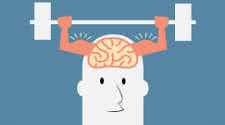The Mind and Body Connection

Identify the Muscle and Mental Mind Link for Success
Can negative emotions make a person physically sick and positive emotions boost the immune system? Researchers have explored the possible interaction between emotions and health, especially in conditions of uncontrolled, persistent stress. According to the simplest theory of this interaction, the brain of an emotionally overwrought person sends signals to the adrenal glands, which respond by secreting cortisol and epinephrine (adrenaline), the hormones that activate the body's stress response. These chemicals are also known to suppress immune functioning, so it has been surmised that the persistently overwrought person undergoes subtle immune changes. What remains to be shown is how these changes affect overall health, if they do at all. According to Marvin Stein, a professor of psychiatry at the Mount Sinai School of Medicine in New York City, "Work thus far on emotions and health adds up to little more than findings in search of meaning."10 We still do not have conclusive proof of a relationship between emotions and health, he argues, but evidence for such a relationship is accumulating.
The notion that laughter can save your life gained wide acceptance with the 1979 publication of Anatomy of an Illness, by magazine editor Norman Cousins. In this book, Cousins recounted his recovery from a rheumatic disease of the spine-ankylosing spondylitis-with the aid of Marx Brothers movies and Candid Camera videos that made him laugh." Similarly, in his 1988 best-seller, Love, Medicine and Miracles, surgeon Bernie Siegel argued that a fighting spirit and the determination to survive are vital adjuncts to standard cancer therapy.
In the 1970's and 1980's, a number of widely publicized studies of the health of widowed and divorced people showed that their rates of illness and death are higher than those of married people. Moreover, their lab tests revealed below-normal immune-system functioning. Several follow- up studies have shown unusually high rates of cancer among depressed people)3 But are these studies conclusive evidence of the mind-body connection? Probably not, because they do not account for many other factors known to be relevant to health. For example, some researchers suggest that people who are divorced, widowed, or depressed are more likely to drink and smoke, to use drugs, to eat and sleep poorly, and to fail to exercise-all of which may affect the immune system. Another possibly relevant factor is that such people may be less tolerant of illness and more likely to report their problems.
Among the work most widely cited as proof that psychosocial treatment can help patients fight disease is an experiment involving women with advanced breast cancer. David Spiegel, professor of psychiatry at Stanford University, reported in 1989 that 50 women randomly assigned to a weekly support group lived an average of 18 months longer than 36 similarly afflicted women not in the support group. The implication of this finding is that the women in the support group cheered each other up while they endured agonizing therapy and that this allowed them to sleep and eat better, which promoted their survival. But a significant flaw in Spiegel's study was his failure to specifically measure immune functioning.
In fact, the immune system changes measured in various other studies of the mind-body connection are relatively small. (They are nowhere near as large as the disruptions that occur in people with AIDS, for example.) The health consequences of such minute changes are difficult to gauge because the body can tolerate a certain amount of reduced immune function without illness resulting. The exact amount the body is able to tolerate and under what circumstances are still unresolved questions. 16
In summary, although there is a large body of evidence pointing to at least a minor association between the emotions and physical health, there is still no definitive proof of such a relationship. Clearly, we still have a lot to learn in this area. In the meantime, however, maintaining an optimistic mindset is probably sound advice.